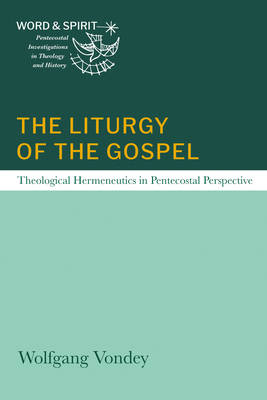
Bedankt voor het vertrouwen het afgelopen jaar! Om jou te bedanken bieden we GRATIS verzending (in België) aan op alles gedurende de hele maand januari.
- Afhalen na 1 uur in een winkel met voorraad
- In januari gratis thuislevering in België
- Ruim aanbod met 7 miljoen producten
Bedankt voor het vertrouwen het afgelopen jaar! Om jou te bedanken bieden we GRATIS verzending (in België) aan op alles gedurende de hele maand januari.
- Afhalen na 1 uur in een winkel met voorraad
- In januari gratis thuislevering in België
- Ruim aanbod met 7 miljoen producten
Zoeken
€ 43,45
+ 86 punten
Uitvoering
Omschrijving
Vondey argues that theological hermeneutics in Pentecostal perspective is the interpretation of the world explicitly and specifically informed by the liturgy of the gospel. This book identifies the corresponding hermeneutical questions that have dominated the formation of a liturgical Pentecostal horizon of interpretation since the twentieth century. Pentecostals are acutely aware that the claim of their interpretive position shows not only a fusion of horizons but also a rejection of the dominant descriptive mechanisms. How this tension in the history of Pentecostal theology is resolved and contributes to the emergence of Pentecostalism as a hermeneutical tradition is the subject of three critical inquiries: (1) the question of truth in the Pentecostal tradition, (2) the extension of the question of truth to hermeneutical experience, and (3) the ontological shift of Pentecostal hermeneutics. Vondey identifies how Pentecostal hermeneutics emerged not only thematically and historically but experientially and subjectively through the themes of the full gospel. This book shows that rather than by the dominance of language, the dynamic hermeneutical positioning in the narrative of this gospel originated and continues to be shaped liturgically.
Specificaties
Betrokkenen
- Auteur(s):
- Uitgeverij:
Inhoud
- Aantal bladzijden:
- 242
- Taal:
- Engels
- Reeks:
Eigenschappen
- Productcode (EAN):
- 9798385250783
- Verschijningsdatum:
- 12/09/2025
- Uitvoering:
- Paperback
- Formaat:
- Trade paperback (VS)
- Afmetingen:
- 152 mm x 229 mm
- Gewicht:
- 331 g

Alleen bij Standaard Boekhandel
+ 86 punten op je klantenkaart van Standaard Boekhandel
Beoordelingen
We publiceren alleen reviews die voldoen aan de voorwaarden voor reviews. Bekijk onze voorwaarden voor reviews.









